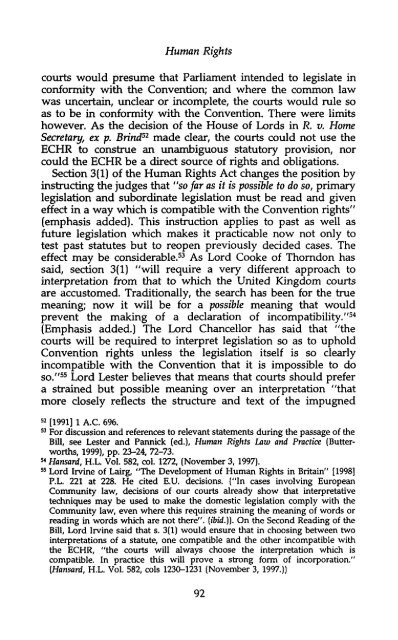HAMLYN - College of Social Sciences and International Studies ...
HAMLYN - College of Social Sciences and International Studies ...
HAMLYN - College of Social Sciences and International Studies ...
You also want an ePaper? Increase the reach of your titles
YUMPU automatically turns print PDFs into web optimized ePapers that Google loves.
Human Rights<br />
courts would presume that Parliament intended to legislate in<br />
conformity with the Convention; <strong>and</strong> where the common law<br />
was uncertain, unclear or incomplete, the courts would rule so<br />
as to be in conformity with the Convention. There were limits<br />
however. As the decision <strong>of</strong> the House <strong>of</strong> Lords in R. v. Home<br />
Secretary, ex p. Brind 52 made clear, the courts could not use the<br />
ECHR to construe an unambiguous statutory provision, nor<br />
could the ECHR be a direct source <strong>of</strong> rights <strong>and</strong> obligations.<br />
Section 3(1) <strong>of</strong> the Human Rights Act changes the position by<br />
instructing the judges that "so far as it is possible to do so, primary<br />
legislation <strong>and</strong> subordinate legislation must be read <strong>and</strong> given<br />
effect in a way which is compatible with the Convention rights"<br />
(emphasis added). This instruction applies to past as well as<br />
future legislation which makes it practicable now not only to<br />
test past statutes but to reopen previously decided cases. The<br />
effect may be considerable. 53 As Lord Cooke <strong>of</strong> Thorndon has<br />
said, section 3(1) "will require a very different approach to<br />
interpretation from that to which the United Kingdom courts<br />
are accustomed. Traditionally, the search has been for the true<br />
meaning; now it will be for a possible meaning that would<br />
prevent the making <strong>of</strong> a declaration <strong>of</strong> incompatibility." 54<br />
(Emphasis added.) The Lord Chancellor has said that "the<br />
courts will be required to interpret legislation so as to uphold<br />
Convention rights unless the legislation itself is so clearly<br />
incompatible with the Convention that it is impossible to do<br />
so." 55 Lord Lester believes that means that courts should prefer<br />
a strained but possible meaning over an interpretation "that<br />
more closely reflects the structure <strong>and</strong> text <strong>of</strong> the impugned<br />
52 [1991] 1 A.C. 696.<br />
53 For discussion <strong>and</strong> references to relevant statements during the passage <strong>of</strong> the<br />
Bill, see Lester <strong>and</strong> Pannick (ed.), Human Rights Law <strong>and</strong> Practice (Butterworths,<br />
1999), pp. 23-24, 72-73.<br />
54 Hansard, H.L. Vol. 582, col. 1272, (November 3, 1997).<br />
55 Lord Irvine <strong>of</strong> Lairg, "The Development <strong>of</strong> Human Rights in Britain" [1998]<br />
P.L. 221 at 228. He cited E.U. decisions. ("In cases involving European<br />
Community law, decisions <strong>of</strong> our courts already show that interpretative<br />
techniques may be used to make the domestic legislation comply with the<br />
Community law, even where this requires straining the meaning <strong>of</strong> words or<br />
reading in words which are not there", [ibid.]]. On the Second Reading <strong>of</strong> the<br />
Bill, Lord Irvine said that s. 3(1) would ensure that in choosing between two<br />
interpretations <strong>of</strong> a statute, one compatible <strong>and</strong> the other incompatible with<br />
the ECHR, "the courts will always choose the interpretation which is<br />
compatible. In practice this will prove a strong form <strong>of</strong> incorporation."<br />
{Hansard, H.L. Vol. 582, cols 1230-1231 (November 3, 1997.))<br />
92

















